Annual Leadership Forum for Responsible Recruitment 2017
14 July 2017

The first ever forum specifically on the human rights risks associated with the recruitment of migrant workers was held in Berlin on 19-20 June 2017. Hosted by IHRB, the Leadership Group for Responsible Recruitment, and Humanity United, the inaugural Annual Leadership Forum for Responsible Recruitment brought together over 120 international experts from across global brands, suppliers, recruitment agencies, government, and civil society representatives.
Discussions centred around why recruitment is such an important factor in preventing forced labour and trafficking and how the challenges of flawed recruitment processes can be overcome. In particular, the Forum focussed on the payment by many workers of recruitment fees to secure employment abroad.
The forum also highlighted the role of the Leadership Group for Responsible Recruitment, a business initiative committing 11 global brands to the Employer Pays Principle and eradicating worker-paid recruitment fees within the next decade.
No worker should pay for a job - the costs of recruitment should be borne not by the worker but by the employer.
The Employer Pays Principle
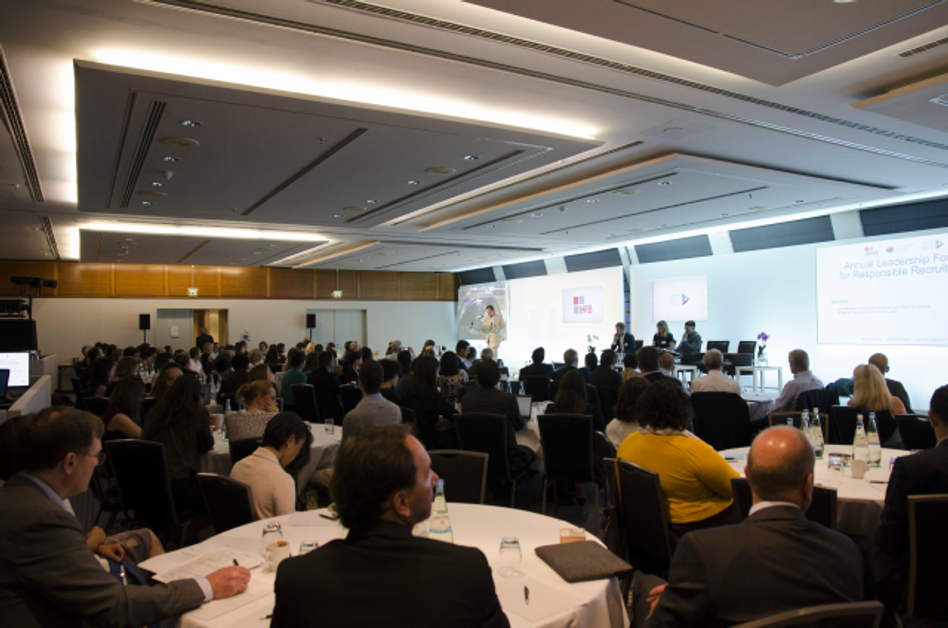
Pictured: John Morrison (IHRB) opens the Annual Leadership Forum on Responsible Recruitment
Key Challenges
Participants were welcomed by John Morrison (IHRB) and Ed Marcum (Humanity United), who framed the Forum’s agenda.
Key takeaways:
- All actors need to work together to increase demand & supply for responsible recruitment and make the Employer Pays Principle an accepted standard.
- Corporations have an important role to play in enacting change: They need to support new models and scale those so they become viable.
- 5 years from now we need a robust set of ethical recruiters.
Migrant workers are vulnerable to abuse and exploitation through the recruitment process. The private sector can be a powerful force to change that, building a system that works for companies and the people they employ.
Ed Marcum
Humanity United
IHRB's John Morrison also announced the addition of four new members to the Leadership Group for Responsible Recruitment - GE, Mars Inc., Tesco, and Vinci - joining seven other global brands committed to the Employer Pays Principle.
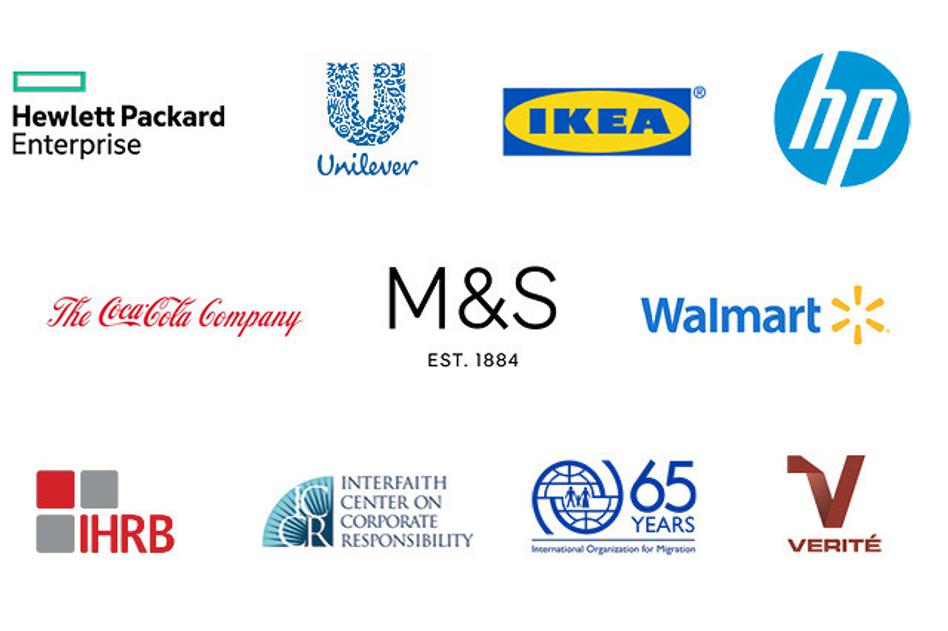
Tackling forced labour in supply chains
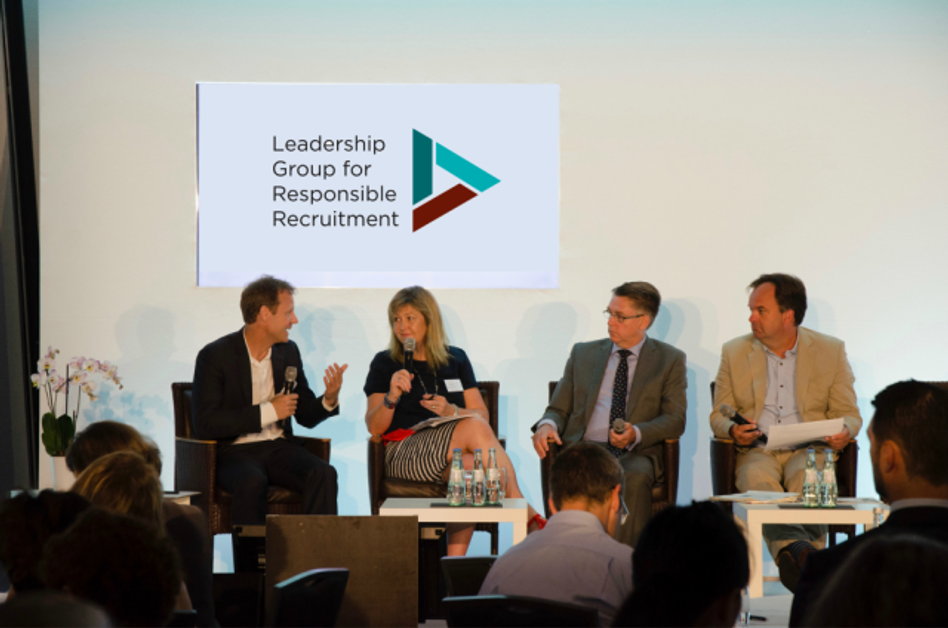
Pictured: Ed Marcum (Humanity United), Louise Nicholls (M&S), Kevin Hyland (UK Independent Anti-Slavery Commissioner), John Morrison (IHRB).
The opening panel included keynote remarks from Kevin Hyland (UK Independent Anti Slavery Commissioner) and Louise Nicholls (M&S).
Key takeaways:
- There is too much siloed learning and too much duplicated learning.
- A common tool box is needed to implement the Employer Pays Principle.
- All actors should work together on collective advocacy: the more we speak with one collective voice, the clearer the message resonates through the global supply chains.
Why is M&S part of the Leadership Group for Responsible Recruitment? Because we recognise there's no part of our business that that's without modern slavery risk, and there's an increasing use of third party labour providers.
Louise Nicholls
M&S
The Leadership Group: towards the Employer Pays Principle

Representatives of Leadership Group companies shared experiences of implementing their respective commitments to ethical recruitment.
Key takeaways:
- The system of workers paying recruitment fees is so embedded culturally that ironically it is sometimes the case that workers think that they are opening themselves up to exploitation if they don't pay a fee. This is an area where the trust between workers and sub agents is significant. Many workers would rather work with someone they know.
- The type of change that is needed can only be achieved through collective action: non-competitive discussions need to be held on these topics.
- Audits cannot solve all the problems in recruitment, investment is needed to be put into capacity building in the supply chain.
- Companies call on governments should show moral authority and lead by example (e.g. in public procurement). Governments cannot make requirements of companies if they are not prepared to meet the same standards.
A clear action we could take in the realisation of Social Development Goal 8 is to commit to the Employer Pays Principle
Marcela Manubens
Unilever
The costs of ethical recruitment

Pictured: William Gois (Migrant Forum Asia), Sarah Tesei (Vinci), Ray Jureidini (Hamad Bin Khalifa University), Eric-Paul Schat (NXP Semiconductors), Shawn MacDonald (Verité)
The critical issue of covering the costs of ethical recruitment was addressed by a panel comprising experts from business, academia and the recruitment sector.
Key takeaways:
- That whole recruitment system needs to be understood and this system begins in countries of destination.
- There is a difference between actual cost of recruitment and what workers are paying. It is only low skilled workers paying fees because they are vulnerable, willing and desperate.
- The language used to describe the money paid by migrant workers to secure employment is inaccurate. There is usually little relation between the sum paid by a worker and the genuine fixed costs of recruitment. The word “charges” might therefore be a more accurate description than “fees”. Companies taking on this cost burden would never pay the sums charged to migrant workers.
- Kick-backs are critical to understand. There are far more workers than necessary because there is money to be made for. Incentives exist for maintaining inefficiencies in the system at the cost of the worker. Need to drive efficiencies and eliminate the unnecessary costs – good for worker and companies.
- These payments should be described as what they really are: the results of extortion.
Drivers for responsible recruitment
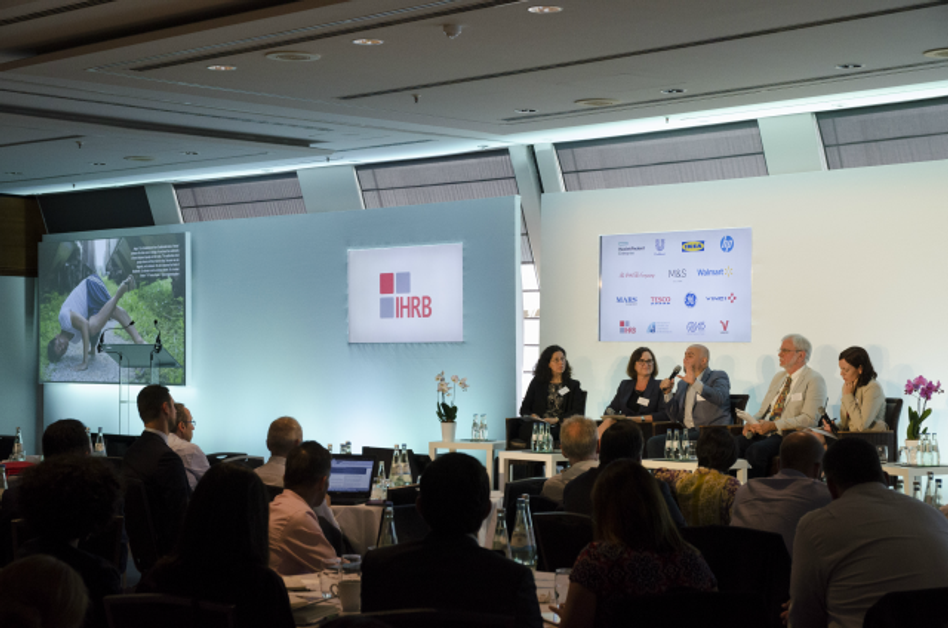
Pictured: Elana Tyrangiel (Hewlett Packard Enterprise), Lara White (UN Migration Agency), Enes Ün (adidas), David Schilling (Interfaith Center on Corporate Responsibility), Rachel Rigby (US Department of Labor)
The drivers of responsible recruitment include legal compliance and established ethical and reputational risks. This panel considered the impact of legislation, investors, certification, and transparency reporting as factors that can influence a greater uptake of the Employer Pays Principles.
Key takeaways:
- Professional (ethical) agencies tend to focus their business on the more lucrative placement of skilled workers or workers deployed on an employment agency basis. Competition from professional and ethical agencies, including the ‘big 8’ global recruitment agencies who dominate other markets, is constrained by legislation prohibiting foreign ownership of recruitment agencies. Lack of legislation prohibiting fee charging or lack of enforcement of labour laws create an unnattractive operating arena for ethical business.
- Vested interests need to be identified in the current system & transparency needs to improve. Within the current recruitment systems from several important sending countries, such as Bangladesh, lie entrenched vested interests of key individuals, often recruitment brokers who also hold political power. These people have a major financial incentive to maintain the status quo of untransparent and unregualated recruitment processes in which the exploited, low-skilled migrant workers bear the brunt of inflated costs.
Building the supply of ethically recruited labour
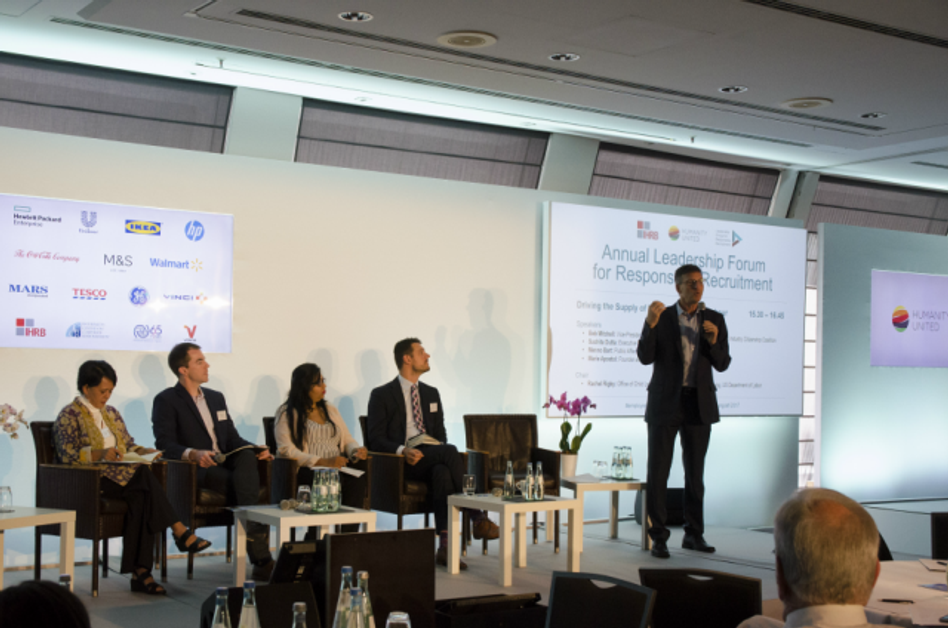
Pictured: Marie Apostol (Fair Hiring Inc), Bob Mitchell (Electronic Industry Citizenship Coalition), Suchita Dutta (Indian Staffing Federation), Menno Bart (Adecco Group), Dan Viederman (Humanity United)
If demand is indeed there, then an assured supply of ethically sourced labour is critical. This panel included participants from industry, civil society and the global recruitment sector.
Key takeaways:
- The market is structured to inhibit ethical actors – it protects incumbents and makes new entry incredibly difficult.
- A service that is free for business will also come with many burdens. Ethical recruitment is not profitable at the moment. Ethical suppliers need to be supported. This support may not only be financial but potentially involve training and capacity building at agencies.
- Agencies can also be supported through engagement with ethical trade associations such as the Indian Staffing Federation. It should be noted only National Trade Associations who are part of the World Employment Confederation (WEC) require their members to commit to an Employer Pays model. WEC also include the 8 largest employment agencies such who could make a significant contribution to this developing market.
- Recruitment Agencies also face challenges in implementing the Employer Pays Principle. They are quick to point out that they often have to pay money to government officials and make payments to hiring managers to secure contracts. The national associations of recruuitment agencies in countries of origin are often unprofessional and ineffectual. Constrained by their members, they can be very factional and are often connected to political parties. In some countries the granting of a licence also includes automatic enrolment in the trade association. This means that these trade bodies are not subject to market forces and and therefore frequently fail to deliver a good level of service, leadership or innovation to their members
- There is power of the demand side – if the demand side insist on ethical standards, then suppliers will respond.
The system of workers paying recruitment fees may be very embedded and entrenched in existing business operations but that doesn't make it right.
Brent Wilton
Director of Global Workplace Rights, The Coca Cola Company
Bringing companies and recruitment agencies together
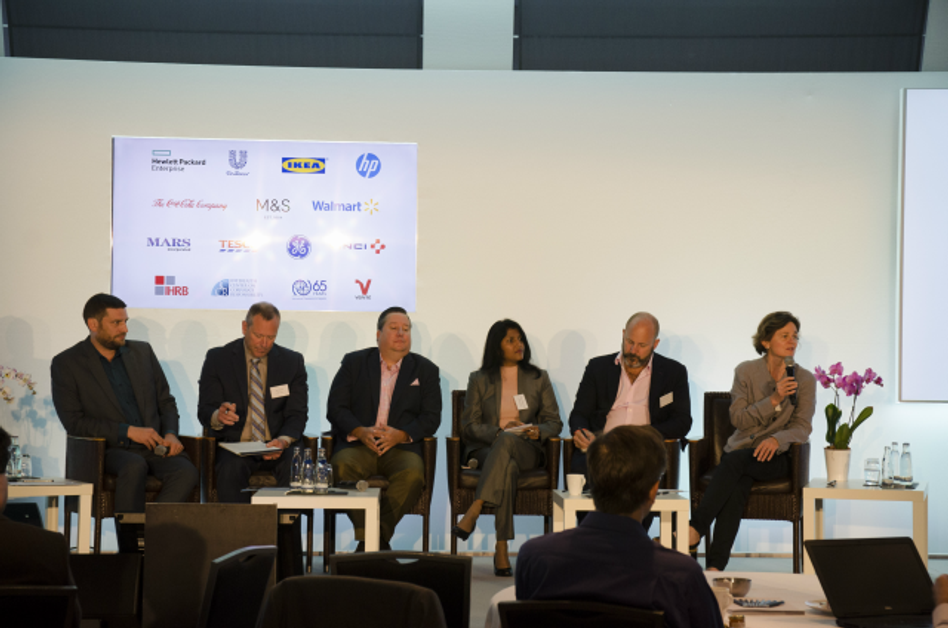
Pictured: Didier Bergeret (Consumer Goods Forum), Jay Celorie (HP Inc.), Michael Murphy (Daruna), Priya Chingen (Princes Tuna Mauritius), Tristan Forster (FSI Worldwide), Frances House (IHRB)
The forum was followed by a Business Breakfast co hosted by the Consumer Goods Forum and IHRB. This group-work session was far more granular in nature allowing attendees to share their own experiences, and through discussion with others, dig deeper into some of the challenges and opportunities outlined above. A number of common themes emerged.
Trust:
- How can business be confident that an Employer Pays model of recruitment is being realised?
- What tools, benchmarks, certifications, audits, due diligence, legislation is needed?
Role of Recruitment Agencies:
- How do we make recruitment agencies allies?
- Meeting the capacity-building needs of both auditors and labour suppliers.
- How can business work with agencies to support and train them, to help them map their own supply chains of sub-brokers, to build their capacity and ensure that they are able to provide a consistent level of professional service?
- What are the benchmarks for best practice? There is a need for qualitative indicators.
- How do we ensure that responsible agencies are rewarded with more business?
- Pilot studies are needed, but there is an urgent need to get moving and begin taking things to scale.

Costs:
- There are clearly costs involved in responsible recruitment (although nothing like the fees charged to many migrant workers).
- How can we ascertain the genuine costs?
- Who is responsible for these costs – the Brand or Supplier?
- How do Brands purchasing practices impact on suppliers and their ability to deliver an Employer Pays model?
- Should fair recruitment costs be separated out, at least initially, as we transition to a new model of recruitment?
The challenges and costs of reimbursement of fees:
- Reimbursement should be an essential requirement.
- Can the threat of reimbursing workers found to have paid fees be used to catalyse an Employer Pays model?
- There is a risk of reimbursement being abused by the workers – it is important to combine with other practices.
- The ultimate cost bearer will often be the consumer.
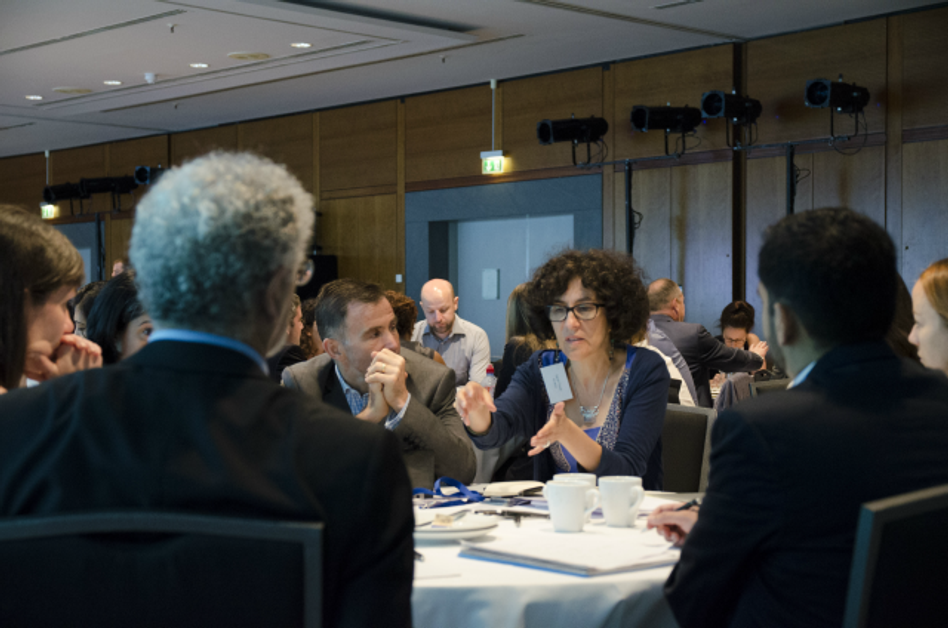
Securing the necessary buy-in:
- The key stakeholder is “labour user” or employer.
- Trade associations and professional bodies are other important stakeholders and can lead practitioners towards best practice.
- Need to demonstrate return on investment within companies. Are there productivity gains?
- Importance of buy-in throughout company across multiple departments
- Need to turn middle managers from gatekeepers to advocates
- How are hiring managers at suppliers trained, supported and monitored?
- What role can migrants themselves play?
- The current model is very entrenched including amongst workers, how can we better communicate employer pays?
- What is the role of migrant organisations and technology platforms that share information in this space?
Legislation:
- Corruption and criminality is endemic in many supply chains.
- Governments can do the necessary “push” towards no fees recruitment.
- Legislation is an important condition as it creates liability for brands at the top of supply chain. It is important that rules are clear and transparent.
- Legislation (and enforcement) is needed at both, national and international levels.
- Laws need to be translated into guidelines and industry norms.
Next Steps
The 2018 Annual Leadership Forum will take place in Singapore 11-12 June 2018. Please save the date. The Leadership Group will report back on progress with its pilot work in pushing the Employer Pays Principle down one or more specific recruitment corridors, and more information on the Responsible Recruitment Gateway will follow in due course. The Resource Bank will be regularly updated with reports and information about on-going responsible recruitment initiatives globally to promote good coordination and minimal duplication of effort. Please send relevant information you wish to post to neill.wilkins [at] ihrb.org.





